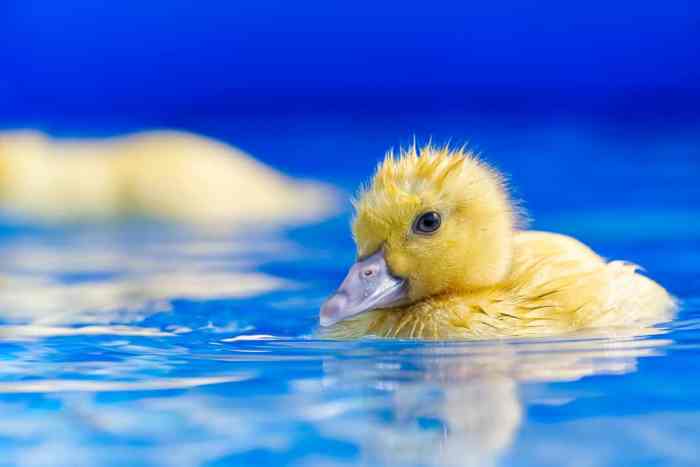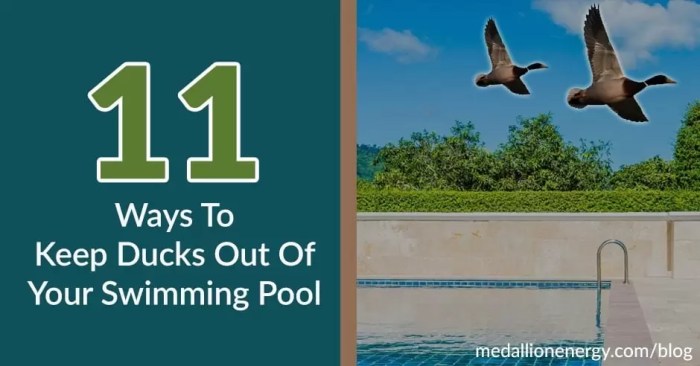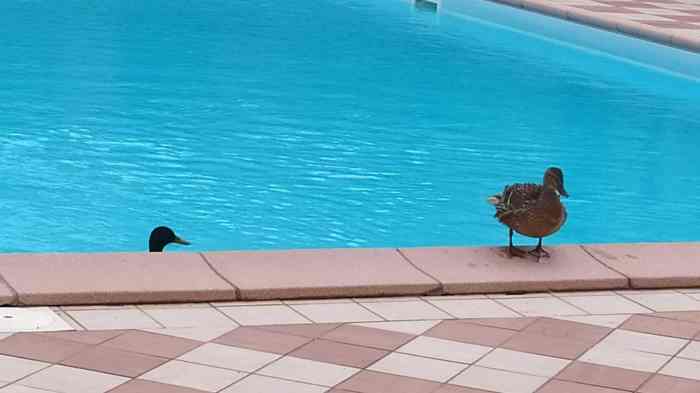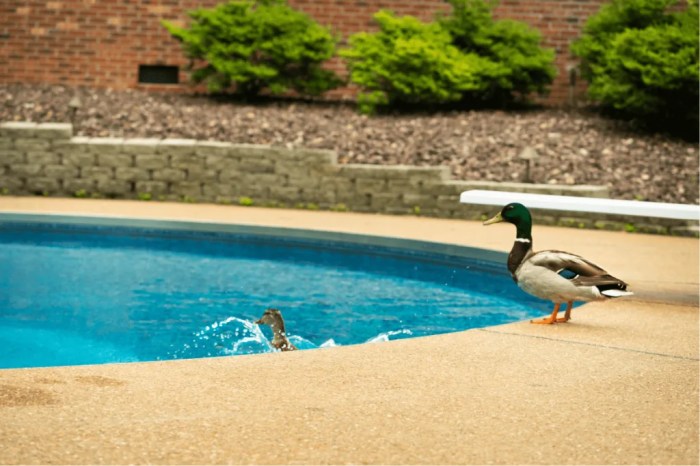Keep ducks out of pool: a common concern for pool owners. These feathered friends can wreak havoc on your backyard oasis, leaving behind a trail of droppings and feathers. But fear not! This comprehensive guide will equip you with a range of effective methods and humane deterrents to keep ducks away from your pool, ensuring a pristine and inviting swimming experience.
From physical barriers to chemical deterrents, motion-activated sprinklers to decoy predators, we’ll explore a variety of strategies to protect your pool from these uninvited guests. Additionally, we’ll delve into habitat modification techniques and training methods to help you create a duck-unfriendly environment and encourage them to seek alternative water sources.
Prevention Methods

Determined ducks can be persistent in their attempts to access pools, but there are several effective prevention methods available to keep them out. These include physical barriers, chemical deterrents, and environmental modifications.
Keeping ducks out of your pool can be a challenge, but there are a few things you can do to deter them. One is to provide them with a more attractive place to swim, such as a duck house with a built-in pool.
There are many different duck house ideas available, so you can find one that fits your needs and budget. Once you have a duck house, place it in a location that is away from your pool and has plenty of shade.
Physical Barriers
Physical barriers are a reliable way to prevent ducks from entering pools. These barriers can take various forms:
- Pool Netting:Fine-mesh netting can be placed over the pool’s surface, creating a physical barrier that prevents ducks from landing or swimming in the water.
- Pool Fencing:A fence around the pool can effectively keep ducks out. The fence should be at least 2 feet high and have mesh openings small enough to prevent ducks from squeezing through.
- Pool Covers:Pool covers provide a complete barrier over the pool’s surface, preventing ducks from accessing the water altogether.
Humane Deterrents: Keep Ducks Out Of Pool

Humane deterrents are a compassionate approach to keeping ducks away from pools without harming them. These methods rely on startling, discomfort, or fear to discourage ducks from entering the area.
Motion-Activated Sprinklers
Motion-activated sprinklers detect movement and release a burst of water, startling ducks and causing them to flee. These devices are effective because they provide an unexpected and unpleasant surprise, discouraging ducks from returning to the area.
There are a few things you can do to keep ducks out of your pool, such as installing a fence or planting a vertical herb garden around the perimeter. A vertical herb garden not only looks great, but it also provides a natural deterrent for ducks.
The strong scents of the herbs will keep the ducks away, and you’ll have a beautiful garden to enjoy as well. You can find more tips on keeping ducks out of your pool at this website.
Ultrasonic Devices
Ultrasonic devices emit high-pitched sounds that are unpleasant to ducks. These sounds are inaudible to humans and most other animals, making them a discreet and effective deterrent. Ultrasonic devices are typically placed around the perimeter of the pool to create an invisible barrier that keeps ducks away.
Decoy Predators
Decoy predators, such as owls or coyotes, can be used to scare away ducks. These decoys mimic the appearance of natural predators, triggering the ducks’ instinctive fear response and causing them to avoid the area.
Habitat Modification

Modifying the habitat around your pool can make it less appealing to ducks and encourage them to find other areas to frequent. This involves eliminating food sources, altering landscaping, and creating a more natural habitat for ducks away from the pool.
Removing Food Sources
- Bird feeders: Relocate bird feeders away from the pool area. Ducks are attracted to birdseed, so removing this food source will make your pool less appealing to them.
- Pet food: Keep pet food indoors or in a sealed container. Ducks will also eat pet food, so keeping it out of their reach will help to deter them.
- Other food sources: Remove any other potential food sources from the pool area, such as fallen fruit or spilled food.
Landscaping
- Plant dense vegetation around the pool: Ducks prefer open areas, so planting dense vegetation around the pool will make it less inviting to them. Choose plants that are not attractive to ducks, such as thorny shrubs or plants with strong scents.
- Create a physical barrier: Install a fence or other physical barrier around the pool to prevent ducks from entering the area.
- Use motion-activated sprinklers: Motion-activated sprinklers can startle ducks and deter them from entering the pool area.
Creating a Natural Habitat, Keep ducks out of pool
Creating a more natural habitat for ducks away from the pool can also help to keep them out of the pool. This involves providing them with a place to nest, feed, and rest.
- Provide a nesting box: Ducks will often nest in sheltered areas, such as under bushes or in trees. Providing them with a nesting box in a secluded area away from the pool will give them a place to nest and raise their young.
- Create a feeding area: Ducks need a place to feed, so creating a feeding area away from the pool will help to keep them out of the pool. Fill the feeding area with duck food, such as corn or cracked corn.
- Provide a resting area: Ducks also need a place to rest, so creating a resting area away from the pool will help to keep them out of the pool. The resting area should be in a shady spot with plenty of vegetation.
Last Recap

Keeping ducks out of your pool requires a multifaceted approach that combines physical deterrents, humane solutions, and habitat modification. By implementing the strategies Artikeld in this guide, you can effectively discourage ducks from entering your pool area, ensuring a clean and enjoyable swimming experience for you and your family.
Remember, it’s important to prioritize humane methods and respect wildlife. By creating a less attractive environment for ducks and providing them with alternative water sources, you can coexist peacefully with these beautiful creatures while maintaining the integrity of your pool.